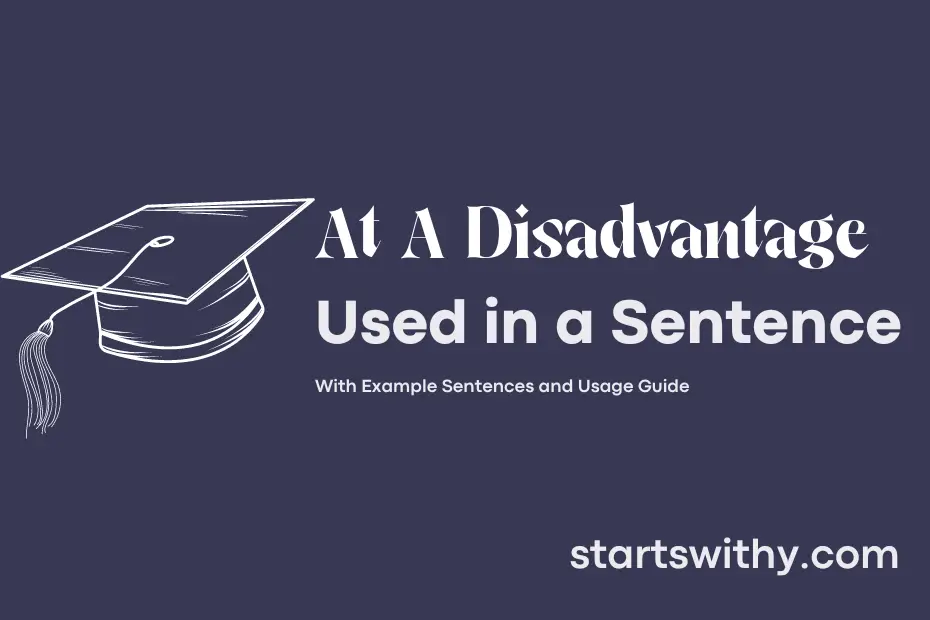When someone is “at a disadvantage,” they are in a position that makes achieving success or a favorable outcome more difficult compared to others. This phrase is often used to describe situations where someone has fewer resources, opportunities, or support than their counterparts, putting them at a disadvantage in achieving their goals.
Being “at a disadvantage” can occur in various contexts, such as in sports, academics, or the workplace, and can impact an individual’s ability to perform at their best. It signifies an unequal playing field where one party faces obstacles that hinder their progress or success.
7 Examples Of At A Disadvantage Used In a Sentence For Kids
- The turtle was at a disadvantage in the race against the rabbit.
- She felt at a disadvantage when she forgot her pencil at home.
- The little bird was at a disadvantage because it couldn’t fly as high as the others.
- He was at a disadvantage in the game because he didn’t know the rules.
- The puppy was at a disadvantage because it had a injured paw.
- The caterpillar was at a disadvantage because it was too slow to keep up.
- She felt at a disadvantage when the other kids had bigger pencils.
14 Sentences with At A Disadvantage Examples
- At a disadvantage when applying for internships without any prior work experience.
- Students from rural areas may be at a disadvantage due to lack of exposure to technology.
- At a disadvantage if you don’t have access to study materials and resources that your peers have.
- Group projects can put some students at a disadvantage if they struggle to collaborate effectively.
- At a disadvantage when competing for limited spots in extracurricular activities or clubs.
- Language barriers can leave some students at a disadvantage when it comes to communication in a multicultural environment.
- Students with learning disabilities may be at a disadvantage without proper support and accommodations.
- Students studying in a second language can feel at a disadvantage during exams and assignments.
- Being timid or introverted can put students at a disadvantage in networking and public speaking opportunities.
- At a disadvantage if you have financial constraints and cannot afford to participate in study tours or workshops.
- Students without a strong academic background in a particular subject may be at a disadvantage in advanced courses.
- At a disadvantage when facing discrimination or bias based on gender, caste, or religion.
- Lack of access to high-speed internet can put students at a disadvantage during online classes and exams.
- International students may feel at a disadvantage due to cultural differences and adjusting to a new academic system.
How To Use At A Disadvantage in Sentences?
To use At A Disadvantage in a sentence, begin by identifying a situation where someone or something is in a less favorable position compared to others. For example, “She felt she was at a disadvantage during the job interview because she lacked experience in the field.”
When using the phrase, remember that “at” is a preposition that indicates a specific position or condition. “Disadvantage” refers to a situation where someone or something has inferiority or difficulty compared to others. By combining the two words, you can highlight scenarios where an individual or group faces challenges or obstacles.
To ensure clarity in your sentence, it’s essential to provide context or details about why the person or thing is at a disadvantage. This can help your audience understand the specific circumstances that are impacting their ability to succeed or perform well in a given situation.
In summary, when incorporating At A Disadvantage into your writing or speech, remember to:
1. Identify a scenario where someone or something is in a less favorable position.
2. Provide context or details to explain why they are facing challenges.
3. Use the phrase to emphasize the obstacles or difficulties that the individual or group is experiencing.
Conclusion
In summary, individuals or groups who are at a disadvantage face challenges that limit their opportunities or hinder their success compared to others. Whether it’s due to unfair treatment, lack of resources, or social barriers, being at a disadvantage can have lasting effects on one’s life outcomes. In various contexts such as education, employment, or healthcare, those at a disadvantage may struggle to overcome systemic barriers and achieve equal footing with their more advantaged counterparts.
Overall, addressing inequalities and creating opportunities for those at a disadvantage is crucial for building a fair and inclusive society where everyone has a chance to succeed. By recognizing and actively working to reduce disparities, we can strive towards a more equitable and just world for all individuals, regardless of their starting point or circumstances.



